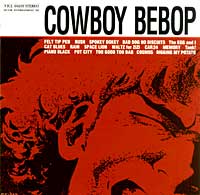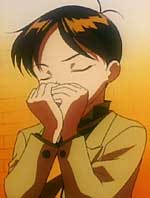
by Luis Reyes
|
"In Japan, various genres of music that are reflected in my work are already played on the airwaves in the forms of
commercials and whatnot so I was exposed to it. Especially in Tokyo," Kanno says, perplexed at questions about her musical
style. Point blank, her style is music.
Kanno's orchestral scores, meant to amplify emotions, leant a heightened sense of wonder and awe to the elements on screen,
a guide to the kind of sensations the audience should be having. Cowboy Bebop's music distracts from such empathic steerage,
more content in providing a haunting inappropriateness to the soundtrack that resonates well with the utter confusion of its
protagonists.
"I hear everyone talk about how many genres I work in like classical, jazz and others," Kanno comments in an interview with
EX. "But personally, I don't divide music by genre when creating. I don't create by saying, 'I must create a
classical piece here,' or 'I must create a jazz piece here.' When I create music, I don't consider at all which genre I like
best, but what the scene or the anime calls for, like a love theme or a mood. There isn't one genre I like more than the others.
find all of them satisfying and all inspire me in different ways."
But, undeniably, much of Kanno's Bebop score consists of jazz. Similarly evocative, the jazz riffs of The Thrill's "Blue Submarine
No. 6" soundtrack pay homage to the experimental jazz of the 50s and 60s, drawing from the work of such artists as Miles David and
John Coltrane. This infusion of jazz into popular anime titles might, itself, point at a new direction for anime. But though
Kanno's compositions may have the same general musical feel, her pieces tend to be led more by melody than harmony, conjuring more
the soul of pop-cultural assimilation than revering the sound itself. Her music evokes the tone of yesteryear's cop shows,
blaxploitation films and the like - she uses the cultural vocabulary of the past fifty years as a tool in shaping her music, and,
inherently, Cowboy Bebop a whole - which itself might point at a new direction in anime.
"The director of 'Cowboy Bebop' is very keen on the music scene but he didn't give any direction on where I should go,"
Kanno continues in her EX interview. He learned working with me on 'Macross Plus' that I don't follow his orders
even if he gave any."
Above all, it's Kanno's subtle musical wit that gives the "Cowboy Bebop" music a life of its own. In the blaxploitation
riff "Mushroom Samba" groovy bass lines, punctuated with brass forte syncopation, coats the episode in a film of schlock that
takes its blatantly racist style to the necessarily absurd extremes.
Kanno slips the familiar tri-note introduction to John Barry's "James Bond" theme into "Rush," the second track on the first
"Cowboy Bebop" album, O.S.T. 1. That 60s lounge jazz pervades the first few episodes of "Bebop," starting the series out with a
tongue in cheek noirism that plunges into poignancy by "Ballad of Fallen Angels." Organ music introduces the finale of "Ballad,"
and the finale of the first DVD - here, though, the music stops with the first shot fired, leaving the gun play that ensues to
score the piece; and this sequence ends with a lullaby voiced by angelic-sounded children. "Spokey Dokey's" Mississippi harmonica
blues, while bathing the piece in Americana, speaks to the desolation each member of the Bebop crew feels, speaking in overtones
everything they keep buried in their hearts.
An undercurrent of despair keeps the characters in "Cowboy Bebop" from ever recovering, a marked contrast to Kanno herself
who prefers to write for happier tales, at one point even expressing interest in writing music for an animated movie cast
completely with animal characters. At the rate she's going, one can't imagine it being too long before Disney snatches her up
for a future barnyard project.
But most impressive about Yoko Kanno is her ardently dedicated global fan base, linked through a consortium of web sites to
spread the gospel of this characteristically modest, youthfully energetic and unyieldingly gracious musician who is absolutely
shocked that she's become as famous as she has.
Appreciation to @anime and EX
for the posting of their rare US interviews with Yoko Kanno. Also thanks to Kevin Lilliard at A Fan's View for permission to use the
image of Yoko Kanno.
|
||||||||
|
Cowboy Bebop © Sunrise / Bandai Ent.
|


